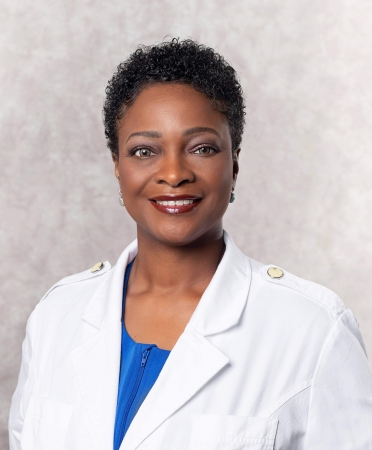
As we celebrate Black History Month, we’re spotlighting our caregivers, the diversity they bring and the difference they make at UT Health East Texas.
Shonda Marsh comes from a family where healthcare runs deep. Her mother, uncle, sister, cousins and relatives as far back as they can trace the family tree have had a hand in healthcare professions. But her biggest influence by far is her maternal grandmother, who she credits to inspiring not only her interest in healthcare, but also her drive for advancing diversity and inclusion.
“She grew up in the segregated South and she was one of the first black nurses allowed to work in Tyler,” Marsh said. “She was so resilient. She’s always been an advocate for people who wouldn’t speak up for themselves. She was so strong.”
Her grandmother Pearlie told stories of protesting “Colored Only” restrooms and water fountains and for the right to sit at the soda fountain in downtown Tyler, Marsh said, noting that “all they wanted was a Coke.
“She knew that’s not the correct way, that God wants to treat his people equally,” Marsh said. “She did not see any sort of inequality because that’s not how God works.”
Marsh drew on her grandmother’s advice early in her career, in the 1990s, when she was called racial slurs by patients.
“It would upset me, it would hurt me because I would say, ‘I’m trying to help you.’ My grandmother said, ‘Still be cordial, still be kind because they’re sick and they need you,’” Marsh said. “She always told us no matter how people treat you, you treat them with utmost respect because you don’t know what their story is or what they’re going through.”
Marsh brings that mindset into her work daily. It’s part of what she loves about her job and why she chose to work in long-term acute care, where the average patient’s stay is a minimum of 26 days.
“My joy is getting to know people. I like to know a person’s history, a person’s story, and how they went from one point in life to being where they are here in the hospital,” Marsh said. “We’re able to bond with the patient, figure out exactly what their needs are and get them to the level where they’re able to go to rehab or home. To see someone you didn’t think was going to make it wake up one day, go to rehab and have a decent and normal life, that is so amazing.”
Marsh said COVID-19 has been hard because of the toll it took on patients and caregivers, but she still tries to “look for inspiration everywhere and always be mindful of the person to the left or right of you because you don’t know if this person is in a low place in their life. You should always be kind because you never know what that person is going through.”
That also translates to her work as a member of the UT Health East Texas Diversity and Inclusion Council.
“Diversity and equality and inclusivity — we have to have that because hate is contagious and it can also be generational. You have to gradually start implementing different thought processes,” she said. “I think we’re making huge strides just by having the conversation and opening the doors. At the end of the day I want people to know they can come to UT Health East Texas and know they have an opportunity to work in a place like this and feel respect and represented.”
